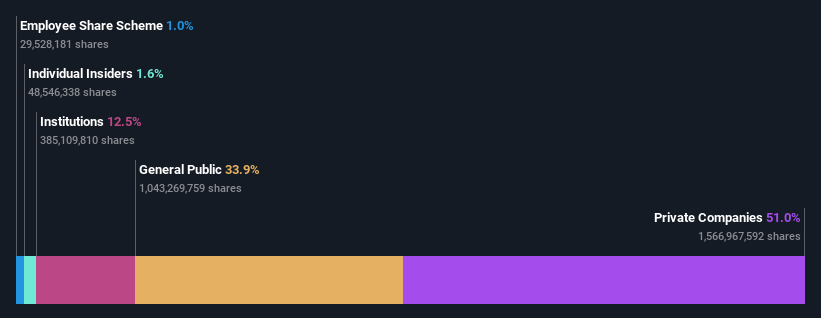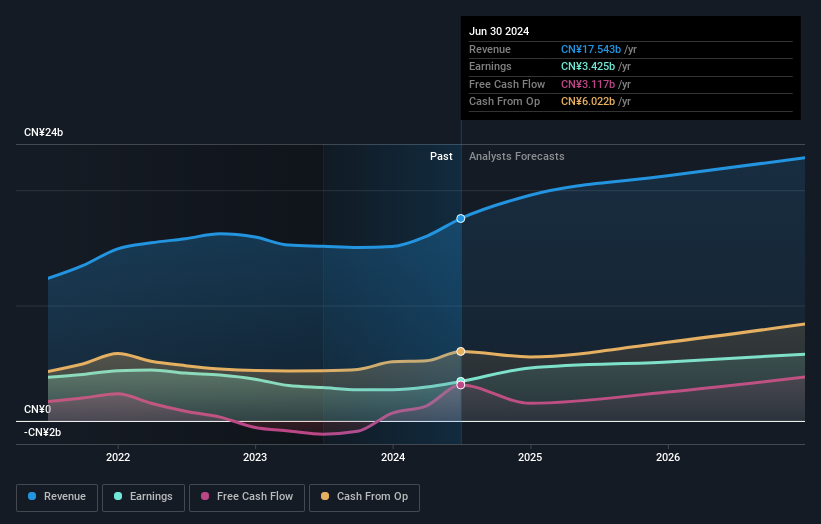Private companies among Zhejiang NHU Company Ltd.'s (SZSE:002001) largest shareholders, saw gain in holdings value after stock jumped 5.5% last week
Key Insights
- Significant control over Zhejiang NHU by private companies implies that the general public has more power to influence management and governance-related decisions
- The largest shareholder of the company is NHU Holding Group Co.,Ltd with a 50% stake
- Institutions own 13% of Zhejiang NHU
If you want to know who really controls Zhejiang NHU Company Ltd. (SZSE:002001), then you'll have to look at the makeup of its share registry. And the group that holds the biggest piece of the pie are private companies with 51% ownership. That is, the group stands to benefit the most if the stock rises (or lose the most if there is a downturn).
As a result, private companies were the biggest beneficiaries of last week’s 5.5% gain.
In the chart below, we zoom in on the different ownership groups of Zhejiang NHU.
See our latest analysis for Zhejiang NHU

What Does The Institutional Ownership Tell Us About Zhejiang NHU?
Many institutions measure their performance against an index that approximates the local market. So they usually pay more attention to companies that are included in major indices.
We can see that Zhejiang NHU does have institutional investors; and they hold a good portion of the company's stock. This can indicate that the company has a certain degree of credibility in the investment community. However, it is best to be wary of relying on the supposed validation that comes with institutional investors. They too, get it wrong sometimes. It is not uncommon to see a big share price drop if two large institutional investors try to sell out of a stock at the same time. So it is worth checking the past earnings trajectory of Zhejiang NHU, (below). Of course, keep in mind that there are other factors to consider, too.

We note that hedge funds don't have a meaningful investment in Zhejiang NHU. Our data shows that NHU Holding Group Co.,Ltd is the largest shareholder with 50% of shares outstanding. This implies that they have majority interest control of the future of the company. Shanghai Chongyang Investment Management Co., Ltd. is the second largest shareholder owning 2.3% of common stock, and National Council for Social Security Fund holds about 1.9% of the company stock.
While it makes sense to study institutional ownership data for a company, it also makes sense to study analyst sentiments to know which way the wind is blowing. There are plenty of analysts covering the stock, so it might be worth seeing what they are forecasting, too.
Insider Ownership Of Zhejiang NHU
The definition of company insiders can be subjective and does vary between jurisdictions. Our data reflects individual insiders, capturing board members at the very least. The company management answer to the board and the latter should represent the interests of shareholders. Notably, sometimes top-level managers are on the board themselves.
I generally consider insider ownership to be a good thing. However, on some occasions it makes it more difficult for other shareholders to hold the board accountable for decisions.
We can report that insiders do own shares in Zhejiang NHU Company Ltd.. It is a very large company, and board members collectively own CN¥1.2b worth of shares (at current prices). It is good to see this level of investment. You can check here to see if those insiders have been buying recently.
General Public Ownership
With a 34% ownership, the general public, mostly comprising of individual investors, have some degree of sway over Zhejiang NHU. While this group can't necessarily call the shots, it can certainly have a real influence on how the company is run.
Private Company Ownership
We can see that Private Companies own 51%, of the shares on issue. It might be worth looking deeper into this. If related parties, such as insiders, have an interest in one of these private companies, that should be disclosed in the annual report. Private companies may also have a strategic interest in the company.
Next Steps:
It's always worth thinking about the different groups who own shares in a company. But to understand Zhejiang NHU better, we need to consider many other factors. Be aware that Zhejiang NHU is showing 1 warning sign in our investment analysis , you should know about...
But ultimately it is the future, not the past, that will determine how well the owners of this business will do. Therefore we think it advisable to take a look at this free report showing whether analysts are predicting a brighter future.
NB: Figures in this article are calculated using data from the last twelve months, which refer to the 12-month period ending on the last date of the month the financial statement is dated. This may not be consistent with full year annual report figures.
Have feedback on this article? Concerned about the content? Get in touch with us directly. Alternatively, email editorial-team (at) simplywallst.com.
This article by Simply Wall St is general in nature. We provide commentary based on historical data and analyst forecasts only using an unbiased methodology and our articles are not intended to be financial advice. It does not constitute a recommendation to buy or sell any stock, and does not take account of your objectives, or your financial situation. We aim to bring you long-term focused analysis driven by fundamental data. Note that our analysis may not factor in the latest price-sensitive company announcements or qualitative material. Simply Wall St has no position in any stocks mentioned.
 Index Options
Index Options CME Group
CME Group Nasdaq
Nasdaq Cboe
Cboe TradingView
TradingView Wall Street Journal
Wall Street Journal